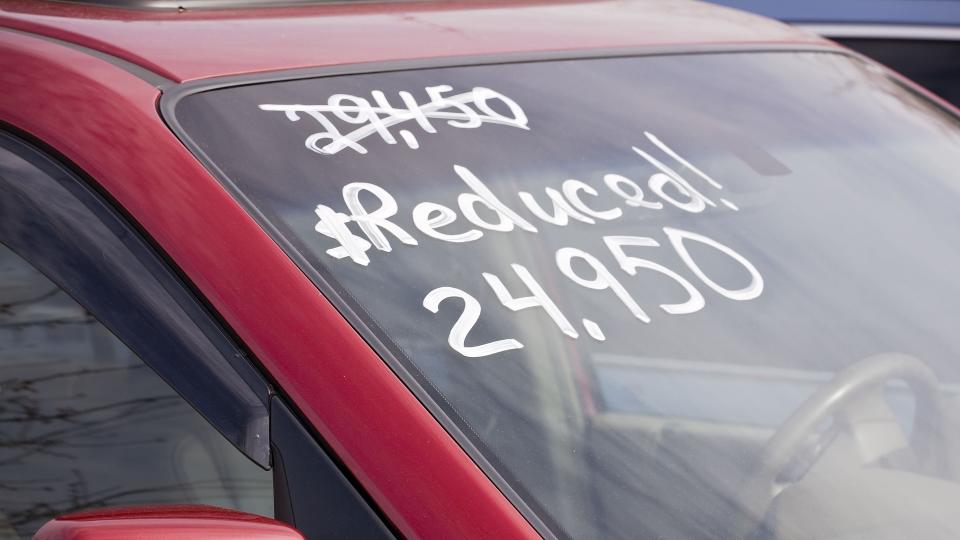Car Prices Remain High — Is Buying Out-of-State the Answer?

Whether you’re looking to buy a specific make or model that isn’t readily available or want to take advantage of a great deal, there’s no reason to limit your car hunting to your home state besides convenience.
Learn More: 4 Sneaky Car Dealership Scams That Will Be Illegal in 2024
Find Out: How To Get $340 Per Year in Cash Back on Gas and Other Things You Already Buy
Buying a car out of state is completely acceptable, but you need to consider a few things that will make the purchase process go smoothly. The process is more complicated than buying closer to home, but purchasing an out-of-state vehicle could save you money and be worth your time.
Here are some things to keep in mind if you plan on crossing state lines to buy a new ride.
Sponsored: Owe the IRS $10K or more? Schedule a FREE consultation to see if you qualify for tax relief.
How Badly Do You Want It?
According to Forbes, whether you’re buying new or used, from a dealer or a private seller, you need to be sure you want the car you’re looking at. Traveling back and forth to check out an interesting listing or a “maybe” is more time consuming and costly than driving a few blocks.
Read Next: 5 Used Cars You Shouldn’t Buy
Get a Vehicle History Report
If you’re buying a used car, it’s essential to look up the car’s history through a reputable source. Don’t take the vendor’s word for it — check out services like CarFax and AutoCheck, the U.S. Department of transportation’s recall search site and the National Motor Vehicle Title Information System (NMVTIS) site to protect yourself from title fraud and ensure what you’re buying is safe.
Registration and Title
Contact your local Department of Motor Vehicles (DMV) office to see what paperwork is required and what the rules are for buying an out-of-state car. You’ll be registering the car in your home state, however, you might need to get a temporary registration if you plan on driving your new purchase home. As far as titling is concerned, a dealer will take care of the paperwork required for that, but a private seller will need to sign a bill of sale and title transfer. Forbes recommends contacting both your DMV and that of the seller before purchasing.
Emissions, Safety and Smog Standards
If the car you’re buying wasn’t built to meet emissions standards in all states, you’ll need to know if the bar you’re buying will pass the emissions tests in your home state. Additionally, some states might have more rigorous safety and smog requirements than the state you’re buying from. While dealers will most likely take care of that, private sellers won’t.
Get an Independent Inspection
As Car and Driver says, arranging a car inspection prior to purchase is a good idea. A vehicle history check can only tell you so much, whereas an independent mechanic will check the car over and give you the inside scoop on the vehicle’s health. If there are any major red flags, you can walk away or negotiate a better price. If the seller won’t budge on price or won’t allow an inspection, you should be suspicious.
Paying State Sales Tax
No matter where you buy your car, you’ll need to pay taxes in the state in which you register it (although a dealership might collect the sales tax and give you a receipt, per Car and Driver). You can forget about saving money by buying a car in a state that doesn’t have sales tax — if you live in such a state already, you won’t be charged anything.
Driving or Shipping it Home?
There are a few extra questions you need to ask yourself when you purchase a car out of state, like, “How am I going to get my car home?” If you live relatively close, you’ll probably simply drive it home (although you have to arrange to get there to buy it). As mentioned above, check if you’ll need to temporarily register the car in the seller’s state as you drive it from there to home. Shipping the car home will cost a pretty penny, but it might be the only available option.
More From GOBankingRates
This article originally appeared on GOBankingRates.com: Car Prices Remain High — Is Buying Out-of-State the Answer?

 Yahoo Finance
Yahoo Finance 